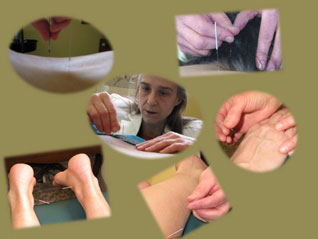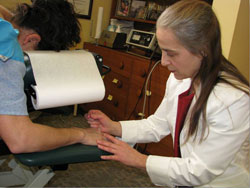Acupuncture and Fertility of Women and Men
Illness and distress (physical, mental and emotional) cause energetic disruption in the energy flowing in "meridians" through the mind and body, and in particular, the reproductive organs.
The Body, Mind and Spirit need an abundance of free flowing Qi
Qi is an energy force that moves through our bodies and the universe. In a state of health, peace and balance, Qi is in constant "flow", always moving. In the body, the Qi moves in specific channels that have been identified as energy meridians. The control of Qi flow through these meridians is via specific gates identified as acupuncture "points" (365 acupuncture points in the human body, plus "extra points").

Acupuncture Adjusts the Flow of Qi
Acupuncture adjusts the flow of Qi in the body, leading Qi to areas where it is insufficient and draining it from areas where it is stuck and/or superabundant via the placement of needles into the at prescribed acupuncture points. In this way, acupuncture restores harmonious balance and integrates the health of mind and body. In Chinese, there is a saying, "If there is pain, there is no free flow; it there is free flow, there is no pain." Acupuncture promotes and re-establishes the free flow of Qi.
Women: The reproductive organs of the pelvis-the ovaries, uterus and fallopian tubes and the neuro-endocrine glands regulating reproduction--the hypothalamus and pituitary glands--malfunction if Qi is either insufficient or not flowing freely. Disrupted Qi flow results in hormone imbalance and a renegade ovulation pattern and menstrual rhythm in women.
Acupuncture can enhance women's reproductive health in the following ways*:
- Increases blood flow of the reproductive glands and organs;
- Enhances the viability of the endometrial lining of the uterus for embryo implantation and reception of maternal nutrients for growth;
- Stimulates normal hormone production and promotes regulation of the endocrine system that allowing for more effective ovulation and fertility;
- Reduces stress hormones such as cortisol that interfere with ovulation and the sleep cycle;
- Improves the quality of cervical mucus;
- Increases the nutrient level available to eggs, enhancing the viability of eggs released by the ovaries;
- Improves pregnancy rates and rates of clinical births in women utilizing IVF (in vitro fertilization);
- Helps with pain reduction and enhances the levels of "feel good" hormones known as endorphins.
(See the Research Science section this website for the supporting scientific research and abstracts that support these statements.)
Men: When the free flow of abundant Qi is present in a man, fertility and reproductive vigor abound. However, stress, age, illness, and mental, emotional or physical distress can interrupt a male’s free flow of Qi. Eventually a disruption of Qi flow affects a man's health and the body mind connection. This results in malformed, slow sperm that are low in numbers for males, (not to mention performance anxiety and erectile dysfunction).
It is important to note that sperm maturation is 70-90 days, so a male partner may want to start treatment with acupuncture and herbs 2-3 months prior to an intended conception date or IVF procedure with his partner.
Decreased male reproductive function results in several disease patterns that can affect sperm production and quality, identified in Chinese Medicine as**
- Kidney Yin vacuity;
- Kidney Yang vacuity;
- Qi stagnation and blood stasis; and
- Damp heat in the lower burner,
Acupuncture is often augmented with Chinese herbal medicine to treat these patterns of male infertility.
The purpose of acupuncture and herbal therapy is to treat:
- Sperm Motility
- Sperm Count and Morphology
- Male Vigor
- Erectile Dysfunction
- Immune Factors and/or Varicocele
- Stress
(See the Male Fertility section of this website).
* Raymond Chang, MD medical director, Meridian Medical Group, "What Your Doctor May NOT Be Telling You", January, 2007
** Lifang Liang, OMD, PhD, LAc "Acupuncture & IVF, Increase IVF Success By 40-60%", Blue Poppy Press, August, 2003
Note that the World Health Organization recognizes acupuncture's effectiveness for over 40 common medical disorders, such as:
- Ear, Nose & Throat Disorders Toothaches, earaches, sinusitis, rhinitis, laryngitis
- Respiratory Disorders
Colds & flu, bronchitis, asthma, allergies, emphysema - Gastrointestinal Disorders,
Food allergies, nausea, indigestion, diarrhea, constipation, ulcers, colitis - Circulatory Disorders
Hypertension, high cholesterol, arteriosclerosis, angina pectoris - Urogenital Disorders
Cystitis, stress incontinence, neurogenic bladder, prostatitis, prostatic hypertrophy - Gynecological Disorders
Menstral irregularity, endometriosis, PMS, infertility, menopausal syndrome - Musculoskeletal Disorders
Tennis elbow, frozen shoulder, TMJ, sciatica, low back pain, arthritis, carpal tunnel syndrome, fibromyalgia - Psycho-emotional & Neurological Disorders
Depression, anxiety, insomnia, headache, migraine, trigeminal neuralgia, intercostal neuralgia, post-stroke paralysis, dizziness, tinnitus.
In addition, acupuncture has been used for centuries in Asia to treat hundreds of other health issues.

